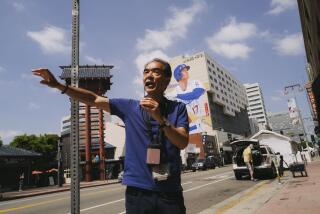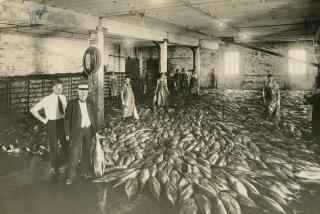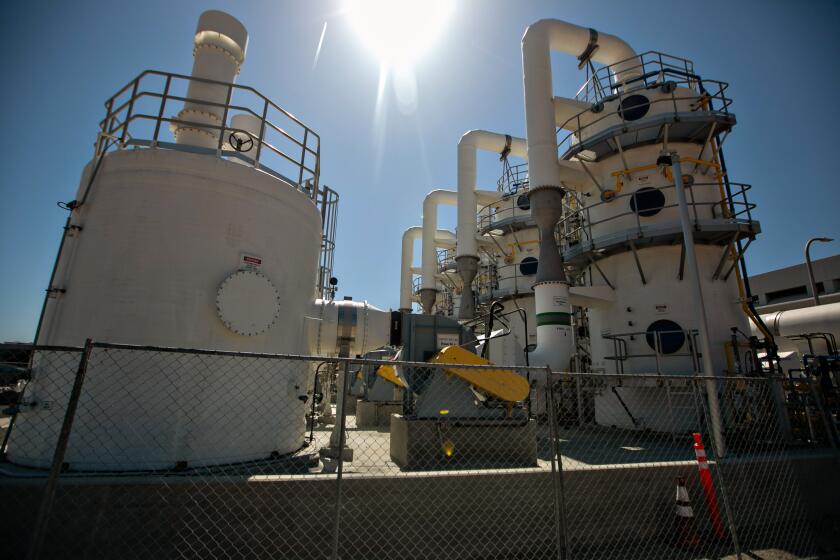In Japan, a seaside mayor rebuilds his life by rebuilding his town
Futoshi Toba arrived at the hillside Buddhist temple just after dawn, hours before the other mourners, on the April day he bid farewell to his wife, Yumi.
He found the small urn containing her ashes among a solemn sea of containers for the 1,500 residents of Rikuzentakata who died in Japan’s devastating earthquake and tsunami.
Toba, 46, laid a white chrysanthemum next to his wife’s remains. He said a brief prayer, and made her a promise.
Holding back tears, he vowed to raise the couple’s two young sons to become good men. “I swore I would do the best job I could in rebuilding this town,” he said later, “but I said this place would never be the same without her.”
Toba is mayor of the town of 23,000 in northern Japan, a job he took barely a month before an unstoppable wall of water turned the seaside community into a wasteland of shattered lives and scattered wreckage.
Now Rikuzentakata is among scores of towns along Japan’s northeastern coast challenged with rebuilding communities that have thrived here for centuries. His sleeves rolled up, Toba is a symbol of the public and private anguish Japan must overcome to move past the tragedy.
The ceremony for those who died — on the 49th day since the disaster, a juncture at which Buddhists believe the dead enter the spirit world — was set to begin at 10 a.m.
But Toba couldn’t wait. The tsunami had killed a third of Rikuzentakata’s two dozen city workers, including three top school officials, two city council members and the chief of police. But the rebuilding goes on and Toba had to get back to work.
He will soon begin public discussion on a renovation plan he hopes will strike the right balance between practicality and aesthetics. But questions remain: Will residents be allowed to rebuild or be forced to relocate to the mountains, high above the water’s reach? Will the town build a mammoth tsunami wall that might block views of the sea, turning a scenic town, as Toba worries, “into a prison”?
That morning at the temple, the mayor readied himself for the challenge. Saying goodbye to the mother of his children, he turned away, feeling stabs of guilt yet determined to face the future. His town depended on him.
*
Moments before the magnitude 9 earthquake, Toba called Yumi at home to plan dinner. The couple’s two sons — Taiga, 12, and Kanato, 10 — were at school.
The two met in the late 1990s while working in a chicken-processing plant. She was a local girl; he was a former computer programmer from Tokyo who had decided to relocate to the town where his father was born and raised.
The couple married and quickly had their two boys. Toba followed his instinct for politics — getting elected to the city council before becoming vice mayor and finally assuming the town’s top post. Yumi, he said, had always been against his political career, but endured it silently.
On March 11, when the quake triggered a 40-foot-high wave, Toba joined others on the roof of city hall. He wanted to run to his family, but knew he couldn’t.
The next day, residents surveyed the aftermath of a disaster that destroyed nearly half the town’s houses, including Toba’s. His sons were safe, but Yumi was missing. That’s when he made a decision, perhaps out of personal denial, or public responsibility, or both: He threw himself into his job, too busy, he insisted, to scour the town’s makeshift morgues like other grieving survivors.
Toba slept a few hours each night inside the school office that served as his command center, his days a haze of pressing government officials and philanthropic groups for more aid. He even consulted with Prime Minister Naoto Kan on a plan to create evacuation centers.
At one point, in a videotape later posted on YouTube, Toba implored viewers for anything they could send his town. He mentioned his personal loss only when reporters asked.
“I’m too busy to grieve,” he said. “I’m not the only one who has lost family here.”
More than two weeks after the quake, Toba heard that a body found near his home resembled his 39-year-old wife. One look told him: It was Yumi.
*
The mayor tells the story about a lone pine tree he considers a symbol of his town’s resilience.
Rikuzentakata had had 70,000 red-barked pines that drew visitors to hike amid the lush seaside forest. The mayor saw the trees as central to plans to promote a seaside resort.
Then the tsunami struck, sweeping away all but one solitary specimen among the rubble. The tree, more than 100 feet tall, ramrod straight with only its top branches intact, now stars in a promotional poster. “From your heart, let’s connect,” it says. “Let’s bring back hometown vibrancy.”
Toba has some concrete plans to achieve that goal. He’s traveled to Tokyo to try to persuade a company to build a factory that would lure a younger generation to a community where 40% of the residents are over 65.
He wants to cut paths into nearby hills as community escape routes and build a citywide network of safe houses where people can seek refuge from rising waters.
Japan’s central government has a plan to relocate residents to nearby mountains. But Toba senses resistance to that plan, along with his proposed zoning ordinance to prohibit residents from rebuilding close to shore.
Sato Naoshi, 77, a retired woodcutter, wants to rebuild on the spot a few hundred yards from the water’s edge, where his family has lived for centuries. Tsunamis have hit before, he insists, but people always rebuilt.
“I’ll be at those meetings — I have a lot to say,” he said. “Why can’t I rebuild here? It’s my land.”
Nearby, Tatsuro Kumagaya labors on a project that has rallied neighbors. The 78-year-old carpenter began rebuilding his tiny home two days after the tsunami struck.
While others fled to evacuation centers, he pitched a tent and went to work. He recently finished a blue-roofed house where he and his wife entertain now homeless neighbors who marvel at what the future might hold, even as several bodies still turn up daily, either washed ashore or pulled from the debris.
“He’s stubborn,” said Kumagaya’s wife, Kazuko. “He doesn’t take no for an answer.”
Neither does the mayor. Toba recently created a six-member rebuilding committee, appointing the town’s former head of tourism as its leader. The official had been depressed over the loss of three family members. Toba suggested a dose of his own self-administered medicine: hard work.
“We’ve buried our dead; it’s now time to rebuild our town,” he said. “We have a chance to do this right.”
*
Toba says he hasn’t had much time to consider what life will be like as a single father. He knows his sons miss their mother terribly.
In weaker moments, he apologizes to Yumi for not looking for her body, for not being a better husband. But he knows he will make up for it by being a more attentive father.
Because he knows that like his town, his children depend on him.
More to Read
Start your day right
Sign up for Essential California for news, features and recommendations from the L.A. Times and beyond in your inbox six days a week.
You may occasionally receive promotional content from the Los Angeles Times.







